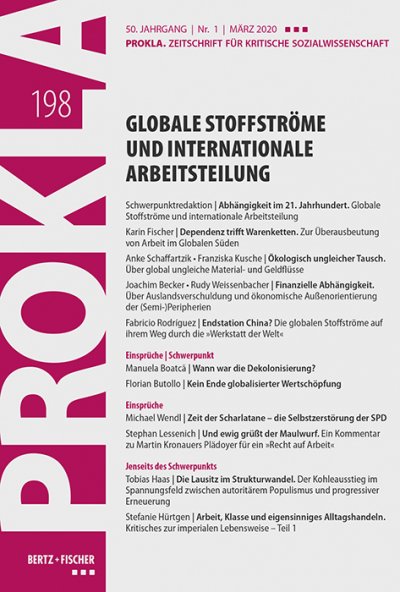Time of the charlatans – the self-destruction of the SPD
Neither the history of ideas nor social history: it is the economy. A replica of PROKLA 196
DOI:
https://doi.org/10.32387/prokla.v50i198.1856Keywords:
SPD, Social democracy, Germany, Third Way, Economic Policy, Monetary Policy, Keynesianism, Neoliberalism, Hartz IV, Neoclassical EconomicsAbstract
PROKLA 196 discussed the crisis of social democracy. Ingo Schmidt sees in his sketch of the history of ideas a process of change in the SPD that has been shaped by the attraction of important economic thinkers. Manfred Wannöffel notes a dwindling power of the labour movement, the social base of the SPD. Both diagnoses absolve the SPD of its responsibility, painting it rather as a party driven to this position. The thesis of the replica, on the other hand, is that the decline of the SPD is rather the result of self-destructive actions of its political leaders, and their deficit in terms of a theoretically-informed independent economic policy.
Downloads
References
Altvater, Elmar (1988): Nationale Wirtschaftspolitik unter Bedingungen globaler »finanzieller Instabilitäten«. Zu Fritz Scharpf’s »angebotspolitischem Keynesianismus«. In: PROKLA 72 18(3): 121-136. DOI: https://doi.org/10.32387/prokla.v18i72.1289.
Altvater, Elmar / Hübner , Kurt / Stanger, Michael (1983): Alternative Wirtschaftspolitik jenseits des Keynesianismus. Opladen. DOI: https://doi.org/10.1007/978-3-322-83981-7.
Bundeskanzleramt (2002): Auf dem Weg zu mehr Wachstum, Beschäftigung und Gerechtigkeit. Thesenpapier für die Planungsklausur am 5.12.2002. Berlin.
Haisken-deNew, John / Horn, Gustav Adolf / Schupp, Jürgen / Wagner, Gert G. (1998): Das Dienstleistungs-Puzzle. Ein deutsch-amerikanischer Vergleich. In: DIW Wochenbericht 65(35): 625-629.
Herr, Hansjörg (2002): Arbeitsmarktreform und Beschäftigung über die ökonomietheoretischen Grundlagen der Vorschläge der Hartz-Kommission. In: PROKLA 129 32(4): 515-536. DOI: https://doi.org/10.32387/prokla.v32i129.684.
Sachverständigenrat zur Begutachtung der gesamtwirtschaftlichen Entwicklung (2001): Jahresgutachten 2001/02. Bundesdrucksache 14/7569.
Scharpf, Fritz W. (1987): Sozialdemokratische Krisenpolitik in Europa. Frankfurt/M-New York.
Slobodian, Quinn (2019): Globalisten. Das Ende der Imperien und die Geburt des Neoliberalismus. Berlin.
Streeck, Wolfgang (1999): Deutscher Kapitalismus. Gibt es ihn? Kann er überleben? In: Korporatismus in Deutschland. Frankfurt/M.: 13-40.
Truger Achim (2009): Ökonomische und soziale Kosten von Steuersenkungen. Das Beispiel der rot-grünen Steuerreform. In: PROKLA 154 39(1): 27-46. DOI: https://doi.org/10.32387/prokla.v39i154.440.
Walpen, Bernhard (2004): Die offenen Feinde und ihre Gesellschaft. Eine hegemonietheoretische Studie zur Mont Pèlerin Society. Hamburg.
Wannöffel, Manfred (2019): Umbruch der Produktionsweise und die Krise des sozialdemokratischen Modells. In: PROKLA 196 49(3): 371-386. DOI: https://doi.org/10.32387/prokla.v49i196.1831.
Wendl, Michael (1997): Die SPD – ratlos zwischen Angebots- und Nachfragepolitik. In: WIDERSPRUCH 17(34): 79-88.






